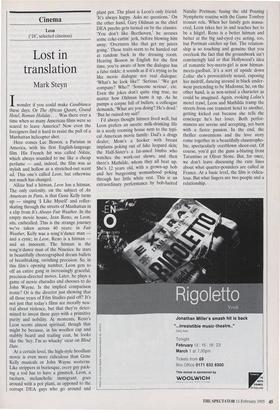Cinema
Leon ('18', selected cinemas)
Lost in translation
Mark Steyn
Iwonder if you could make Casablanca these days. Or The African Queen, Grand Hotel, Roman Holiday. . . Was there ever a time when so many American films were so scared to leave America? Now even the foreigners find it hard to resist the pull of a Manhattan helicopter shot.
Here comes Luc Besson, a Parisian in America, with his first English-language film. His French hit was called Nikita, which always sounded to me like a cheap perfume — and, indeed, the film was as stylish and hollow as a stretched-out scent ad. This one's called Leon, but otherwise not much has changed.
Nikita had a hitman, Leon has a hitman. The only curiosity, on the subject of An American in Paris, is that Gene Kelly turns up — singing 'I Like Myself and roller- skating through the streets of Manhattan in a clip from It's Always Fair Weather. In the empty movie house, Jean Reno, as Leon, sits, enthralled. This is the strange journey we've taken across 40 years: in Fair Weather, Kelly was a song'n'dance man and a cynic; in Leon, Reno is a hitman and an innocent. The hitman is the song'n'dance man of the Nineties: he stars in beautifully choreographed dream ballets of breathtaking, ravishing precision. So, in this film's opening number, Leon gets to off an entire gang in increasingly graceful, precision-directed moves. Later, he plays a game of movie charades and chooses to do John Wayne. Is the implied comparison ironic? Or is the director just showing that all those years of Film Studies paid off? It's not just that today's films are morally neu- tral about violence, but that they're deter- mined to invest these guys with a primitive purity and nobility. At moments, Reno's Leon seems almost spiritual, though that might be because, in his woollen cap and stubbly beard and trailing coat, he looks like the 'hey, I'm so whacky' vicar on Blind Date.
At a certain level, the high-style hoodlum movie is even more ridiculous than Gene Kelly musicals or John Wayne westerns. Like strippers in burlesque, every guy pack- ing a rod has to have a gimmick. Leon, a taciturn, melancholic immigrant, goes around with a pot plant, as opposed to the corrupt DEA guys who go around and plant pot. The plant is Leon's only friend: `It's always happy. Asks no questions.' On the other hand, Gary Oldman as the chief DEA psycho gets turned on by the classics: `You don't like Beethoven,' he accuses some coke-cuttin' jerk, before blowing him away. 'Overtures like that get my juices going.' These traits seem to be handed out at random back in the dressing room. Hearing Besson in English for the first time, you're aware of how the dialogue has a false tinkle; it sounds as if it's trying to be like movie dialogue not real dialogue: `What's he look like?' Serious."We got company? Who?' Someone serious', etc. Even the jokes don't quite ring true, no matter how Oldman hams it up. As he pumps a corpse full of bullets, a colleague demands, 'What are you doing? He's dead.' `But he ruined my suit!'
I'd always thought hitmen lived well, but Leon prefers an ascetic milk-drinking life in a seedy rooming house next to the typi- cal American movie family: Dad's a drugs dealer; Mom's a hooker with breast implants poking out of fake leopard skin; the Half-Sister's a fat-assed bimbo who watches the work-out shows; and then there's Mathilde, whom they all beat up. She's 12 years old, with a grown-up bob and her burgeoning womanhood poking through her little white vest. This is an extraordinary performance by bob-haired Natalie Portman, fusing the old Pouting Nymphette routine with the Game Tomboy trouser role. When her family gets massa- cred, Leon takes her in and teaches her to be a hitgirl. Reno is a better hitman and better at the big sad-eyed eye acting, too, but Portman catches up fast. The relation- ship is so touching and genuine that you overlook the fact that the groundwork isn't convincingly laid or that Hollywood's idea of romantic boy-meets-girl is now hitman- meets-gaolbait. It's a sort of upside down Lolita: she's provocatively sexual, exposing her midriff, dancing around in black under- wear pretending to be Madonna; he, on the other hand, is as non-sexual a character as could be imagined. Again, evoking Lo motel trawl, Leon and Mathilda tramp the streets from one transient hotel to another, getting kicked out because she tells the concierge he's her lover. Both perfor- mances are serene and accepting, yet burn with a fierce passion. In the end, the thriller conventions and the love story come together in a beautifully claustropho- bic, spectacularly overblown shoot-out. Of course, you'd get the guns a-blazing from Tarantino or Oliver Stone. But, for once, we don't leave discussing the cute lines about what quarter-pounders are called in France. At a basic level, the film is ridicu- lous. But what lingers are two people and a relationship.


























































 Previous page
Previous page